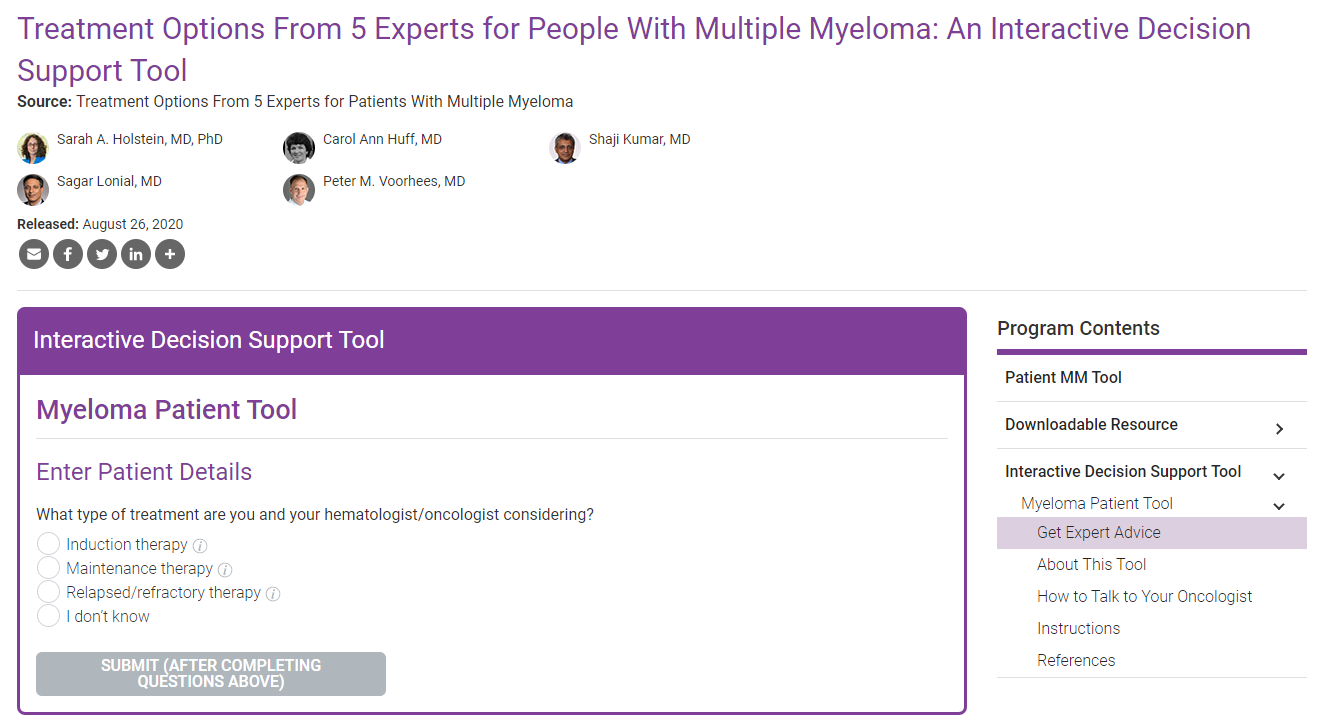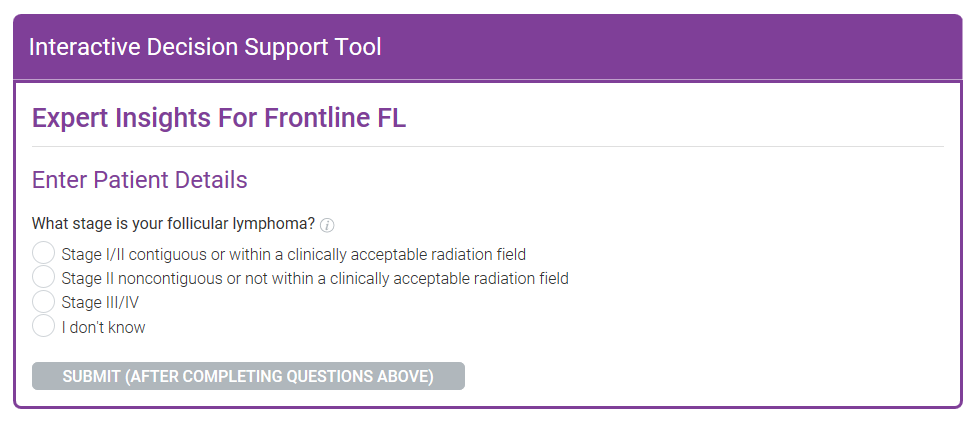GRACE has partnered with Clinical Care Options LLC (CCO) to provide ongoing patient learning materials and tools for those dealing with a cancer diagnosis.
Clinical Care Options LLC, is a global leader in the development of innovative educational programs and technology platforms. CCO’s team has been a pioneer in the creation of continuing education and decision support resources for healthcare professionals both in the United States and around the world for more than 2 decades. GRACE is pleased to work with CCO on a number of patient materials and tools to help our community in their cancer journey.
Scroll below to access the following educational tools:
-
Treatment Options From 5 Experts for Patients With Multiple Myeloma
-
Treatment Options From 5 Experts for Patients With Ovarian Cancer
-
Expert Insights Interactive Decision Support Tool for Advanced NSCLC
-
Information Regarding Immune Checkpoint Inhibitor Therapy
-
Educational Video - Immunotherapy for Advanced NSCLC: Discussing Goals and Treatments With Your Health Care Provider
-
Expert Insights Interactive Decision Support Tool on HER2+ Early Stage Breast Cancer
-
Expert Insights Interactive Decision Support Tool on Melanoma
-
Expert Insights Interactive Decision Support Tool for Frontline Follicular Lymphoma
-
Educational Videos -Measurable Residual Disease (MRD) in Acute Lymphocytic Leukemia (ALL)
 Have you received a diagnosis of multiple myeloma?
Have you received a diagnosis of multiple myeloma?
GRACE is excited to have again partnered with Clinical Care Options to develop an Interactive Decision Support Tool and downloadable resource to help you understand more about your disease and treatment options, so you can become partners with your oncology team in your cancer care.
By answering multiple choice questions about your diagnosis, you will be able to review treatment options from five cancer experts for people with multiple myeloma listed below.
-
-
Sarah A. Holstein, MD, PhD, University of Nebraska Medical Center
-
Sagar Lonial, MD, Emory Winship Cancer Institute
-
Carol Ann Huff, MD, Johns Hopkins Medicine
-
Peter M. Voorhees, MD, Atrium Health
-
Shaji Kumar, MD, Mayo Clinic
Have you received a diagnosis of ovarian cancer?
GRACE has partnered with Clinical Care Options to develop an Interactive Decision Support Tool and downloadable resource to help you understand more about your disease and treatment options, so you can become partners with your oncology team in your cancer care.
The goal of this tool is, by answering multiple choice questions about your diagnosis, you will be able to review treatment options from five ovarian cancer experts listed below.
-
Robert L. Coleman, MD, FACOG, FACS Texas Oncology
- Thomas J. Herzog, MD UC Health
- Ursula Matulonis, MD Dana Farber/Harvard Cancer Center
- Bradley J. Monk, MD, FACOG, FACS Arizona Oncology
- Kathleen Moore, MD Stephenson Cancer Center
 Did you recently receive a diagnosis of non small cell lung cancer?
Did you recently receive a diagnosis of non small cell lung cancer?
GRACE has partnered with Clinical Care Options to develop an interactive online tool to help you understand more about your disease and treatment options. The goal of this tool is to help you better understand your diagnosis of locally advanced or metastatic NSCLC, to better understand your treatment options, and to become partners with the oncology team instead of being a bystander in your cancer care. A series of questions developed by the experts allow you to select information about yourself and your cancer that are necessary to consider when making treatment choices in advanced NSCLC.
Answer a series of multiple-choice questions and then get treatment options chosen by the 5 lung cancer experts listed below.
- David R. Gandara, MD, UC Davis Health
- Melissa L. Johnson, MD, Sarah Cannon
- Suresh S. Ramalingam, MD, Emory Winship Cancer Institute
- Heather Wakelee, MD, Stanford University
- H. Jack West, MD, City of Hope
To assist you in gathering information click here to download a PDF consultation checklist with useful questions for your oncologist about your advanced NSCLC disease. For additional tips please see "How to Talk to Your Oncologist". If you are a health care provider, you can find CCO's clinician-focused tool here: https://www.clinicaloptions.com/oncology/programs/nsclc-clinical-insights/interactive-decision-support-tool/nsclc_tool_2018/page-1?origin=2.
For those dealing with questions regarding immune checkpoint inhibitor therapy, we have developed another helpful downloadable pdf for patients, Understanding the Current Landscape of Immune Checkpoint Inhibitor Therapy in Advanced NSCLC: A Resource for Patients.
If you have questions regarding immunotherapy and would like to discuss if and how it fits into your treatment plan, in partnership with Clinical Care Options, GRACE President Jack West, MD has provided the following helpful information regarding immunotherapy for advanced NSCLC, and discussing goals and treatments with your health care providers.
 Were you diagnosed with HER2-positive early stage breast cancer?
Were you diagnosed with HER2-positive early stage breast cancer?
GRACE has partnered with Clinical Care Options to develop an interactive online tool to help you understand more about your disease and treatment options. This Treatment Decision Support Tool is designed to help you understand more about your cancer diagnosis and treatment options and to become partners with the oncology team. A series of questions developed by the experts allow you to select information about yourself and your cancer that are necessary to consider when making treatment choices.
Answer a series of multiple-choice questions and then get treatment options for neoadjuvant and adjuvant therapy for HER2-positive early breast cancer chosen by the 5 lung cancer experts listed below.
- Frankie Ann Holmes, MD, FACP, Retired US Oncology Research and Texas Oncology
- Sara Hurvitz, MD, FACP, UCLA Health
- Joyce O'Shaughnessy, MD, Texas Oncology-Baylor Charles A. Sammons Cancer Center
- Mark D. Pegram, MD, Stanford Women's Cancer Center
- Denise A. Yardley, MD, Tennessee Oncology
To assist you in gathering information click here to download a PDF consultation checklist with useful questions for your oncologist about your advanced NSCLC disease. For additional tips please see "How to Talk to Your Oncologist".
 Have you been diagnosed with advanced melanoma?
Have you been diagnosed with advanced melanoma?
Clinical Care Options, GRACE, and the Melanoma Research Foundation have partnered to develop an Interactive Treatment Support Tool to help you understand more about your disease and treatment options. This Interactive Decision Support Tool provides treatment options based on the specific characteristics you enter. It is recommended that you have as much information about the characteristics as possible before you begin. To assist you in gathering this information, we have developed a PDF consultation checklist that you can print and fill out with your oncologist.
To begin, simply answer a series of multiple choice questions to receive treatment advice from 5 melanoma experts:
- Michael Postow, MD, Program Director, Memorial Sloan Kettering Cancer Center
- Michael B. Atkins, MD, Georgetown University
- Adil Daud, MD, UCSF Helen Diller Family Comprehensive Cancer Center
- Kim Margolin, MD, City of Hope Comprehensive Cancer Center
- Hussein Tawbi, MD PhD, MD Anderson Cancer Center, UT
To make best use of this tool, it is recommended that you have as much information about your cancer as possible before you begin. To assist you in gathering this information, click here for a PDF consultation checklist with helpful questions for your oncologist. For additional tips, please also see “How to Talk to Your Oncologist.”
If you are a health care provider, you can find CCO’s clinician-focused tool here: https://www.clinicaloptions.com/oncology/programs/advanced-melanoma/interactive-decision-support-tool/advanced_melanoma_tool/page-1
Did you recently receive a diagnosis of follicular lymphoma?
GRACE has partnered with Clinical Care Options to develop an interactive online tool to help you understand more about your disease and treatment options. This Interactive Decision Support Tool provides treatment options based on the specific characteristics you enter. It is recommended that you have as much information about the characteristics as possible before you begin.
Answer a series of multiple-choice questions and then get treatment options chosen by the 5 lymphoma experts listed below.
- John M. Burke, MD (Rocky Mountain Cancer Centers)
- Ian W. Flinn, MD, Ph.D. (Sarah Cannon Research Institute)
- Christopher R. Flowers, MD, MS (Emory University)
- Nathan H. Fowler, MD (The University of Texas MD Anderson Cancer Center)
- Jeff P. Sharman, MD (US Oncology Research)
To make best use of this tool, it is recommended that you have as much information about your cancer as possible before you begin. To assist you in gathering this information, click here for a PDF consultation checklist with helpful questions for your oncologist. For additional tips, please also see “How to Talk to Your Oncologist.”
If you are a health care provider, you can find CCO’s clinician-focused tool here: www.clinicaloptions.com/FLtool
GRACE has also partnered with Clinical Care Options (CCO) Oncology, to share with our community a series of educational videos regarding Measurable Residual Disease (MRD) in Acute Lymphocytic Leukemia (ALL).
The video discussions are put together by the following panel:
- ~Elias Jabbour, MD, Associate Professor Department of Leukemia at the University of Texas MD Anderson Cancer Center in Houston, Texas
- ~Joseph D. Khoury, MD, Professor, Department of Hematology at the University of Texas MD Anderson Cancer Center in Houston, Texas
- ~Aaron C. Logan, MD, Ph.D., Associate Professor Division of Hematology and Blood and Marrow Transplantation at the University of California, San Francisco
In this video series, the doctors discuss MRD in ALL. Topics include:
- Measurable Residual Disease - What Can Physicians Do with MRD Information
- Measurable Residual Disease - What Does it Mean to be MRD Positive
- Measurable Residual Disease - What is MRD and Why is it Important
- Measurable Residual Disease - What Tests Used, How do They Work, and Which is Best for the Patient
- Measurable Residual Disease - When Should they Test MRD and How do they get MRD from Patients
To view these videos in full, please visit https://cancergrace.org/post/clinical-care-options-2018-measurable-residual-disease-acute-lymphoblastic-leukemia.
For more information about this video program with CCO - please visit https://www.clinicaloptions.com/oncology/programs/mrd-in-all/on-demand-video-panel-discussion/mrd-in-all-video.
***Although the information contained in the above Interactive Decision Support Tools has been produced and processed from sources believed to be reliable, no warranty, expressed or implied, is made regarding the accuracy, adequacy, completeness, legality, reliability, or usefulness of any information. Patients should always discuss their healthcare decisions with their oncology care team. This disclaimer applies to both the isolated and aggregate uses of the information. Clinical Care Options and GRACE provide this information on an as-is basis. This disclaimer applies to all data on the GRACE or Clinical Care Options Web sites including but not limited to medical information or opinions.***


